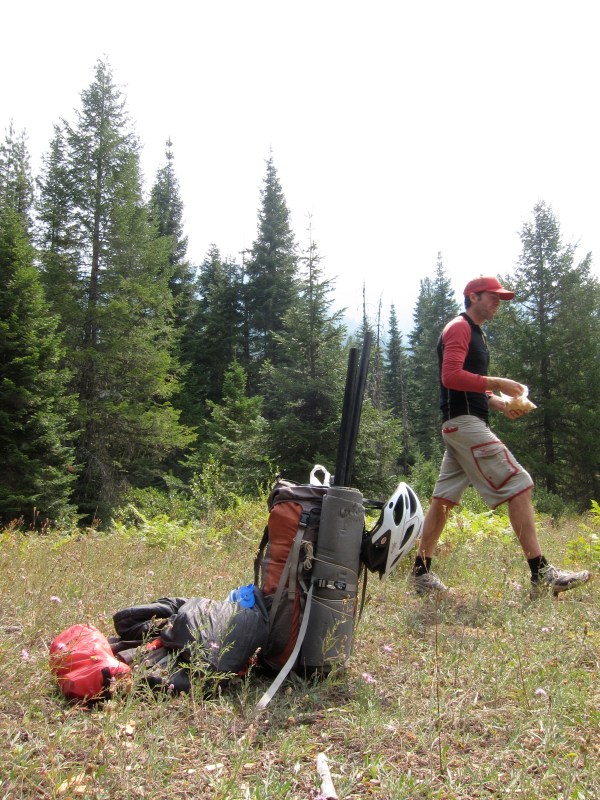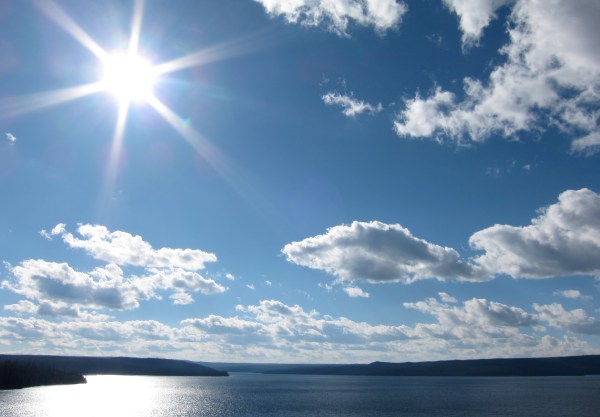The difference between lightweight backpacking and ‘normal’ backpacking is obviously the gear.
Winter has reached that point where we talk about summer. After a long weekend of rain, a bunch of us found ourselves in the Northern in Whitefish after an avy meeting last night, discussing not skiing and snow, but sunshine and fly fishing (Amber is a fish biologist, inside beta!). Pre-emptive nostalgia, if you will.
Of course, it snowed heavily this afternoon, and the first race of 2011 is on skis and taking place tomorrow morning. So carpe diem, for the moment.
Thinking of summer gets me thinking about backpacking. Snow travel is still a mystery to me, at least insofar as the snow-shrouded landscape is for me more hostile and less predictable, less friendly, than that of bare earth and rock. I want to do a lot of backpacking this year.
 Yardsale, White River terminus, Bob Marshall Wilderness
Yardsale, White River terminus, Bob Marshall Wilderness
I’m not really certain that I’m much of a backpacker in the way most folks use the term. I’ve been backpacking since I was around 3, and after working wilderness therapy (the best paid pro backpacking gig around) merely walking in the woods with a sack of gear has little appeal. Add a twist, a remote fishing hole, snow covered pass, rivers to packraft, or an absurd loop to do in a weekend, and my interest returns. This mindset, this wilderness ADHD, this preoccupation with the more egregious forms of human-powered wilderness travel, colors my understanding of backpacking completely.
Which is why I think Phil Turner, quoted in this posts epigraph, is quite wrong. Hendrik got the ball rolling with a provocative post (which engendered the quoted comment) about contemporary weight-weenieism. In the post and the resultant discussion all relevant terrain is covered, save one issue.
A “traditional” backpacker carries a heavy (30+ lbs) pack. The weight of the gear necessitates a heavy pack, the load dictates a slow pace, the pace requires more food, and the circle continues. Use less/lighter stuff, move faster, be happier. Simple equation, one applicable to both the dawn-dusk 30 mile a day camp, and the lolligagin’, 8 mile a day field guides, camera tripods, and reading books crew.
But are less and lighter the same? Yes and no. Different in that less means reducing redundancy (no extra undies), the same in that lighter often means reducing the psychological margin of redundancy and error (my Dana will last 50 years of egregious abuse!). The point is, going lighter and bringing less is at root a mental rather than physical process.
Wilderness is the ultimate form of the Other. I.e.; that which is outside us, our self, our comprehension. The Other reminds us, in literal and metaphysical ways, that our state of being in the world is fragile and transient. When backpacking, gear serves to insulate us from that fear. Some of the insulation is literal; without protection from the elements, food, and water we will die. However, the majority of backpacking gear is for metaphysical, rather than literal, protection from the elements.
Witness Luc Mehl’s pack for an overnight technical packrafting descent (Selway River, Sept 2010). Luc has thin synthetic puffy layers, paddling shells, shorts, and a baselayers shirt. He slept around the fire, and kept warm by paddling stronger than Forrest and me.
Gear is good, but by focusing on it too much and in an excessively literal manner we ignore the more interesting reasons for going out into the woods in the first place. At our (spiritual) peril.
On my agenda for this spring and summer are some trips without a sleeping bag or tarp/tent. Bracing how the very idea flies against conventional wisdom and “safety.”

Leave a reply to A few little things « Bedrock & Paradox Cancel reply